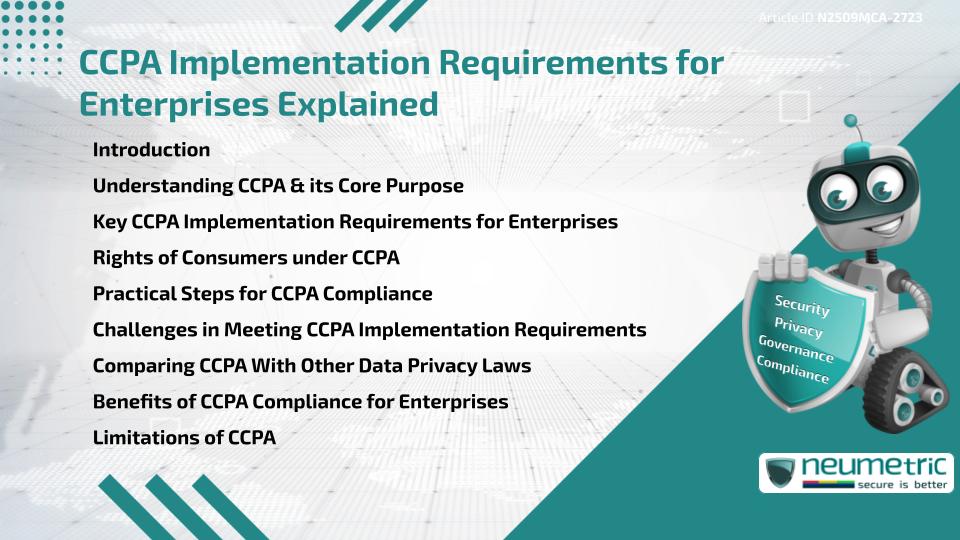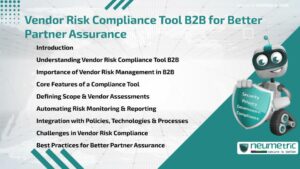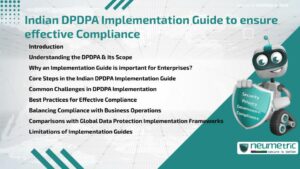Table of Contents
ToggleIntroduction
The California Consumer Privacy Act [CCPA] sets strict rules for how enterprises handle Personal Data of California residents. At its core, the law empowers Consumers with rights such as access, deletion & opting out of data sales. For enterprises, meeting the CCPA implementation requirements involves understanding Data flows, updating Policies & creating Systems that respect Consumer Privacy. While Compliance can be complex, proper implementation builds Trust, avoids Penalties & aligns businesses with rising expectations for Data Protection.
Understanding CCPA & its Core Purpose
The CCPA was enacted to give Consumers more control over their Personal Information. It requires enterprises to disclose what data they collect, why they collect it & how it is shared. The law applies to businesses that meet certain thresholds such as revenue or volume of Personal Data handled. By emphasising Transparency & Accountability, the CCPA aims to protect individuals from misuse of their information in the digital economy.
Key CCPA Implementation Requirements for Enterprises
Meeting CCPA implementation requirements requires enterprises to:
- Maintain Records of Personal Data collected & shared.
- Provide clear Privacy notices to Consumers.
- Enable processes for Consumer requests such as Data Access & Deletion.
- Train Employees to handle data responsibly.
- Put in place secure methods for verifying Consumer identity.
- Avoid discriminatory practices against Consumers exercising their rights.
Enterprises must also update Vendor agreements to ensure third parties comply with CCPA obligations.
Rights of Consumers under CCPA
The law grants California residents specific rights that enterprises must respect:
- The right to know what data is collected.
- The right to delete Personal Information.
- The right to opt out of data sales.
- The right to non-discrimination when exercising these rights.
These rights form the foundation of the CCPA implementation requirements, requiring enterprises to build mechanisms that make Consumer participation straightforward.
Practical Steps for CCPA Compliance
Enterprises can take the following steps:
- Map data across systems to identify where Personal Information resides.
- Update Privacy notices & Website disclosures.
- Create Consumer request handling workflows.
- Implement opt-out mechanisms such as “Do Not Sell My Personal Information” links.
- Audit Vendor relationships for Compliance.
These steps ensure that enterprises not only meet Legal requirements but also strengthen Consumer confidence.
Challenges in Meeting CCPA Implementation Requirements
Compliance is not without difficulties. Enterprises often face challenges such as:
- Tracking Personal Data across multiple platforms.
- Balancing Legal obligations with Business Operations.
- Handling Consumer requests at scale.
- Training Employees effectively.
Small & mid-sized enterprises may find Compliance especially resource-intensive, highlighting the need for efficient processes & tools.
Comparing CCPA With Other Data Privacy Laws
The CCPA is often compared to the General Data Protection Regulation [GDPR] of the European Union. While both laws focus on Data Protection, GDPR requires prior consent for data collection, whereas CCPA emphasises the right to opt out. The scope & penalties also differ, meaning enterprises must treat them as separate but related obligations.
Benefits of CCPA Compliance for Enterprises
While many enterprises view CCPA as a burden, Compliance has benefits:
- Enhanced Trust with Customers.
- Better Data Governance practices.
- Reduced Risk of fines & reputational damage.
- Competitive advantage by demonstrating commitment to Privacy.
These benefits make CCPA implementation requirements not only a legal necessity but also a strategic opportunity.
Limitations of CCPA
Despite its strengths, CCPA has limitations. For example, it applies only to California residents, leaving Gaps in protection for Consumers elsewhere. It also places more responsibility on Consumers to act rather than on enterprises to seek consent. These limitations have fueled ongoing discussions about broader Privacy protections at the national level.
Takeaways
- CCPA sets strict rules for handling Personal Data of California residents.
- Enterprises must provide Transparency, honour Consumer rights & update processes.
- Meeting CCPA implementation requirements is challenging but builds Trust & reduces Risks.
- Compliance offers both legal protection & business benefits.
FAQ
What are the main CCPA implementation requirements?
Enterprises must provide Privacy notices, honour Consumer requests, maintain Records, update Contracts & avoid Discriminatory practices.
Who does CCPA apply to?
It applies to businesses meeting thresholds such as annual revenue above twenty-five (25) million dollars or handling data of fifty thousand (50,000) or more Consumers.
How do enterprises handle Consumer requests under CCPA?
They must create clear processes for requests such as data access, deletion & opting out of sales & verify the identity of the requester.
Is CCPA the same as GDPR?
No, GDPR requires consent before collection, while CCPA focuses on Consumer rights to know, delete & opt out.
What are the penalties for non-Compliance?
Penalties can reach up to seven thousand five hundred (7,500) dollars per violation, along with reputational Risks.
Do Small Businesses need to comply with CCPA?
Only if they meet the revenue or data processing thresholds defined in the law.
How does CCPA affect Vendor relationships?
Enterprises must ensure Vendors processing data on their behalf comply with CCPA obligations through contractual terms.
Need help for Security, Privacy, Governance & VAPT?
Neumetric provides organisations the necessary help to achieve their Cybersecurity, Compliance, Governance, Privacy, Certifications & Pentesting needs.
Organisations & Businesses, specifically those which provide SaaS & AI Solutions in the Fintech, BFSI & other regulated sectors, usually need a Cybersecurity Partner for meeting & maintaining the ongoing Security & Privacy needs & requirements of their Enterprise Clients & Privacy conscious Customers.
SOC 2, ISO 27001, ISO 42001, NIST, HIPAA, HECVAT, EU GDPR are some of the Frameworks that are served by Fusion – a SaaS, multimodular, multitenant, centralised, automated, Cybersecurity & Compliance Management system.
Neumetric also provides Expert Services for technical security which covers VAPT for Web Applications, APIs, iOS & Android Mobile Apps, Security Testing for AWS & other Cloud Environments & Cloud Infrastructure & other similar scopes.
Reach out to us by Email or filling out the Contact Form…





